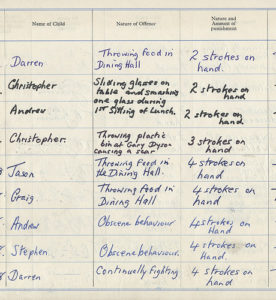School Punishment Book – Photo credit: Philip Howard
Physical Punishment and the Consequences
Many of you have probably read the news articles regarding American Football player, Adrian Peterson, and the child physical abuse allegations for whipping his four year old son with a switch.
I have to live with the fact that when I disciplined my son the way I was disciplined as a child, I caused an injury that I never intended or thought would happen. ~ Adrian Peterson
I believe Adrian Peterson loves his son very much and never meant for his physical discipline methods to result in such harm. I also believe that he was disciplining his son the way his parents punished him. His story highlights the significant problem of a lack of knowledge of alternative discipline strategies which don’t involve corporal punishment. In my work as a Child and Family Clinical Counsellor, I hear over and over again, from many parents, that they are at a loss as to how to discipline their child effectively, without spanking or locking their child in their room. The good news is that although the recommended best practice strategies are relatively new to this generation, they are backed by research and with consistency, they do work. However, before I make some recommendations for effective discipline, it is important to understand the negative long term effects of physical punishment.
Long Term Effects of Physical Punishment
Physical Punishment…
- models that physical aggression is an acceptable behaviour (It’s sadly ironic that Adrian Peterson was trying to teach his 4 year old son not to push his sibling, by physically beating him. How does this make sense to a child?)
- does not teach alternative problem-solving strategies (The root of the word “Discipline” is “to teach”. It sounds as though the siblings were having an issue which needed help in problem-solving.)
- it creates fear and no learning can take place in an emotional state of fear
- increases the likelihood of the child plotting revenge, retreat (complete emotional withdrawal from parent), resentment, rebellion
- it invalidates the child’s own emotional state (Adrian Peterson’s son would have been having his own upset feelings in the first place to have then pushed his sibling. Of course, pushing is not the answer, but talking to both children and hearing both their hurts, would have been the beginning of an emotion-coaching problem solving experience.)
- increases the risk for physical abuse later on other people
- increases behaviours such as aggression, oppositional behaviour (home/school/with friends), anxiety and other types of mental illness
- may start out as a “tap” or a “little spank” (which is still not acceptable for all the aforementioned points) but the parent is likely to be emotionally charged and unable to keep his/her cool and then the “fight” response takes over and it turns into a beating
How To Discipline Effectively without Fear and Physical Methods?
There are two key words to answer this question…
LIMITS and CONSISTENCY
Children NEED limits. If children don’t have limits they will keep pushing and pushing until someone snaps and then there’s a limit (not an effective limit, but to the child’s conscious and unconscious mind it is a limit).
Children NEED consistency. If the ground rules are not concrete/consistent and keep on changing, the child will look for the “wiggle room” and keep pushing and pushing in hopes that this is a day when you have no energy to implement a limit.
How to Set Limits Most Effectively?
- Calmly! If you set a limit, while yelling, you’ve just lost your power, given it to your child and strengthened your child’s misbehaviour! (It’s important to talk in a firm voice but not a voice that shows your buttons have been pushed.) If you know you’re going to yell, give yourself a quick time-out, walk away or tell your child, that you will be back to talk to them in five minutes. Remind yourself that you cannot show them that they’ve pushed your buttons or they will suck up all the power that you’ve just handed to them and repeat the behaviour in the future.
- Use Natural Consequences and Logical Consequences for the message to really take hold. (Unrelated punishments create resentment and defences go up…the learning opportunity is gone.) See my previous article on Consequences vs. Punishments: What’s the Difference?
- Be Strategic! Set your limits but without creating a power struggle! (Remember you want to hold on to your power) Sound impossible? It’s not, it just takes strategy. See my previous article: Decreasing Power Struggles: Top 20 (short) Tips
- Remember BEHAVIOUR = COMMUNICATION…not all behaviour needs to be disciplined. Sometimes a heart to heart talk is needed to find out what are the feelings beneath the behaviour and what are the child’s needs which are not being properly communicated
- If there has been emotional or physical hurt (ie. pushing a sibling), REPAIRing of the relationship is vital. See: The 3 R’s of Parenting: Repair, Reconnect, Revive
- Use S.E.T. communication to set limits. S = Supportive Statement (I know you really want to stay at the park) E= Empathy (and I know you’re mad and frustrated that we have to leave now) T= Truth (but the truth is that we are expected at Auntie’s house in 20 minutes and so we have to leave now, and we will come back to the park next week.) (SET Acronym credit: Authors ~ Jerold J. Kreisman, MD and Hal Straus)
- Don’t go round in circles…if you find yourself going round and round in circles, and you know that you’ve already gone through the discussion/rationale, (supportive and empathic statements) re-state the limit and walk away
- Use an External Policy Maker as the enforcer…For example, “It’s the ocean police rules that you have to wear a life jacket.” “Our house rules forbid physical aggression towards any family member.”
How to Be Consistent?
- Create a written set of house rules as a family (There will be more “buy-in” if all family members had input and agreed ahead of time on the rules) No more than 5 rules and try to write them in the positive. For example, Hands and Feet to Self vs. No pushing or kicking
- Post the rules in a visible place. Ie. the fridge
- Stick to the rules! If there’s an exception, let them know the rationale and let them know ahead of time. For example, “We’re having friends over tonight so all you kids will be able to stay up an hour past bed-time.”
- Be sure you and your parenting partner are on the same page with the rules! If you and your parenting partner are separated/divorced and have different philosophies, explain to your children that rules are sometimes different in different environments (i.e. a birthday party vs. a library) and that these are the rules when they are staying at your house
Being back at school, requires more commitment to sticking to rules (homework, bed-time etc.). I hope that your children have transitioned back-to-school well!
Warmly,
PS Like what you’re reading? You may wish to sign-up for my weekly blog sharing information about parenting, psychology and personal growth. To do so, enter your confidential e-mail in the box at the bottom of this page and you will then receive a confirmation e-mail. Click to confirm and welcome to this supportive parenting community where short, informative articles will be sent directly to your in-box once/week! I look forward to connecting with you.
*If this article inspires you, please consider forwarding to friends and family or sharing through Facebook, Twitter (my Twitter handle is @child_family) or Email. Thank you for helping me get the word out!
Want to Connect?
Subscribe now to receive free weekly parenting tips and inspiration.









